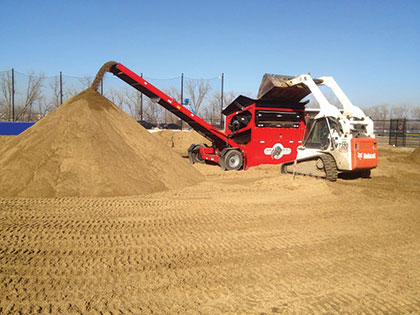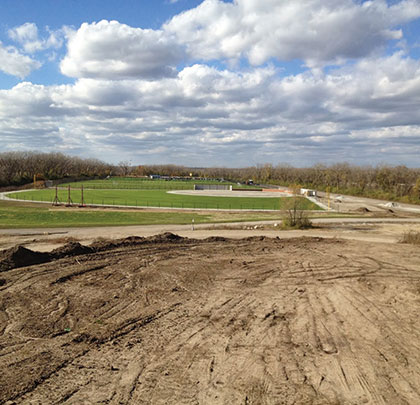The project for R. Sluis Excavating came out of left field 6 years ago. For more than 30 years, the Oak Forest, Illinois, company focused on commercial and residential excavating; developing an 87-acre sports complex was something new.
The opportunity surfaced in late 2009 when Marv Aardema of Don Mar Enterprises, the primary contractor, called Steve Sluis to request his involvement in developing Trinity Christian College’s new athletics fields half a mile from campus.
The 87-acre complex includes a driving range, two softball diamonds, one baseball field, and three soccer fields. The complex is named after George and June Schaaf, who contributed a significant portion of the funding.
The development was possible because of a 100-year lease with the Metropolitan Water Reclamation District of Greater Chicago, which owns the narrow piece of property. A canal had been dug along the premises more than 100 years earlier, and the property had been unexploited for decades. Don Mar Enterprises had been attempting to do the majority of groundwork for nearly 3 years, but Aardema needed some help. He decided to hire a professional excavation subcontractor.
WHEN OPPORTUNITY KNOCKS
R. Sluis Excavating dispatch in and around Chicago to offer specialty excavation services for anyone with the right job. But this project was different, both in terms of scope and the capabilities required. It would push his company’s expertise, Sluis knew, but he wasn’t about to drop the ball; his team was up for the challenge.
There was one big catch. Fresh, sorted, high-quality dirt, sand, and other materials were not in the budget. The project’s planners believed costs could be cut, and profits made, by collecting waste materials from area contractors, landscapers, and homeowners who paid to discard them at the jobsite. From asphalt grindings to clay fill, black dirt to stone, about 100 people per day paid to drop material by the load.
DESTINATION: PRODUCTION
Sluis recognized he would be doing 90 percent of the site work. This was one of the biggest projects in the company’s history. “It was a great job for us,” he says, “but we needed to look into some additional equipment.”
A small screener would make the job for R. Sluis Excavating. Sluis researched several screeners and began testing a few brands and models. Sluis struck out with the poor production of the first three screeners he tested. Finally, Sluis discovered Lake Erie Portable Screeners. The company appeared to have an ideal screening plant—the Pitbull 2300—for the work. There was almost no comparison. “The Pitbull blew right through the dirt we were sorting that day,” Sluis says. “When screening black dirt, I can get up to 80 yards per hour. The other units we tried produced about a quarter of that, maybe less.”
The Pitbull 2300 has been a major player in the project, even more than Sluis expected. He and his sons have used it to separate everything from very fine topsoil to larger stone for building the roads and parking lots. He also has used it for creating an asphalt mixture, as well as blending sand and clay for the baseball infield. In addition, he used the Pitbull to blend the topsoil for all of the grass fields.

In order to cut costs, the crew would collect waste materials from area contractors, landscapers, and homeowners who paid to discard them at the jobsite.
PENNY PINCHER
In terms of keeping the project’s price tag in check, the Pitbull 2300 has been the MVP; Sluis says it has already paid for itself several times over. Although processing and sorting the material on site took time and was paired with operating costs, having the screening plant on site was a much more affordable and convenient option than purchasing materials outright.
Take, for example, the complex’s grass soccer fields. Sluis estimates his company used roughly 4,300 yards of topsoil for the two fields. If the company had purchased pre-screened black dirt at the average rate of $20 per yard, the total cost would have been $86,000, or $43,000 per field. Instead, the project gained money with each load that was dropped. In addition, the monetary impact multiplies with more expensive material, like the baseball mix that costs an average of $60 per yard or stone that costs $18 per ton.
“It’s kind of like double-dipping,” Sluis says. “We’re getting paid to take the materials and make what we need on site rather than paying to have it trucked in. It’s cost-effective, resourceful, and it saves us the time it would take to transport or order materials.”
THE HOME STRETCH
The project has been a breakaway success for R. Sluis Excavating. The crew has learned a lot about screening a range of topsoil materials, and Sluis found the right equipment for building his team. He’s confident the company’s new skills, combined with the Pitbull 2300, will lead to new opportunities in the future.
Sluis says its work on the complex wrapped up in late 2014. According to Trinity Christian College, final completion of the entire complex will be another year or so out. ■
About The Author:
For more news about Trinity Christian College and its sports complex, including the dedication, visit www.trnty.edu. More about R. Sluis Excavating at www.rsluisexcavating.com.
_________________________________________________________________________
Modern Contractor Solutions, February 2015
Did you enjoy this article?
Subscribe to the FREE Digital Edition of Modern Contractor Solutions magazine.

Play Ball


